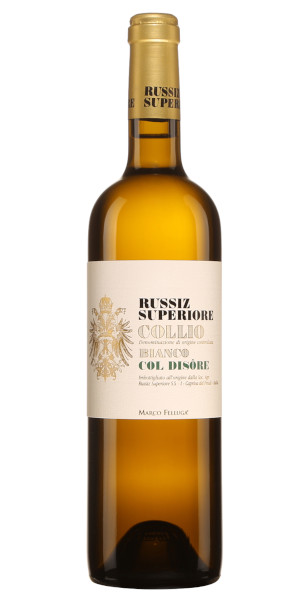Russiz Superiore Col d’Isore (750ml)
-
Wine Type
White Wine
-
Size
750ml
-
Vintage
2017
-
Country
Italy
-
Region
Friuli Venezia Giulia
-
Sub-Region
Collio
-
Grape
Pinot Bianco
-
Farming Method
ConventionalMost products with this label come from producers who do their best to avoid any intervention at all but it’s possible that some of the aforementioned preventative measures and additions are deemed necessary. Learn More
-
ABV
13.5%
-
Food Pairing
Pesto pastaSeafoodWhite Meat
This wine is made by Marco Felluga, a long established wine making family in Northern Italy’s Friuli-Venezia-Giulia region. The family has two wineries here, “Marco Felluga” and “Russiz Superiore” and they own vineyards in various areas of the prestigious Collio territory. The vineyards of Russiz Superiore are located around the winery, in the heart of Collio. In the Friulano language, Col Disôre refers to a hill in the Russiz territory.
The climate is ideal for viticulture; it is mild, thanks to the proximity to the Adriatic sea and the Julian Prealps, with warm days and cool nights. The Collio’s hilly terrain, formed during the Eocene period, is composed of layers of sandstone and loam rock (limestone and clay) that were once the ocean floor. Every hill has its own microclimate. Sandstone-marl soils are the ideal habitat for many white wine varietals which can be enjoyed young but also have the structure and fruit to develop and gain complexity in the bottle.
Tasting Notes
Pronounced aromas of fruit and flowers; white peach, apple, acacia and broom. The palate is at once rich and fleshy with stone fruit and almond flavours and the right amount of sapidity, minerality and freshness. Good structure and a silky texture that coats the palate. A play between savoriness and freshness leads to a long, warm finish with almond undertones.
Method
This wine is 100% Pinot Bianco from grapes grown in the Russiz Superiore, on the hills, area of the Collio DOC. The grapes were handpicked. After harvest, the grapes, including a small portion of overripe grapes, were separated from the stems. The juice and pulp underwent a cold maceration followed by gentle pressing, which separated the skins from the must. Fermentation took place in oak barrels and the wine aged on the lees for about 12 months and was bottle-aged one year.
Our Thoughts
This wonderfully unique wine is bursting with personality; hyper complex, perfectly-integrated wood notes, dried fruit, marmalade, and honey. It’s rich and unctuous but manages to remain fresh and silky smooth on the palate. An exceptionally long, evolving finish is just the icing on the cake.



Reviews